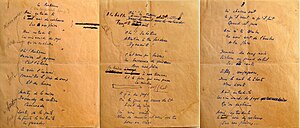| This article needs additional citations for verification. Please help improve this article by adding citations to reliable sources. Unsourced material may be challenged and removed. Find sources: "Chant des Partisans" – news · newspapers · books · scholar · JSTOR (February 2024) (Learn how and when to remove this message) |
You can help expand this article with text translated from the corresponding article in French. (August 2024) Click for important translation instructions.
|

The "Chant des Partisans" ([ʃɑ̃ de paʁ.ti.zɑ̃]; "Song of the Partisans") was the most popular song of the Free French and French Resistance during World War II.
The piece was written and put to melody in London in 1943 after Anna Marly heard a Russian song, namely Po dolinam i po vzgoriam, that provided her with inspiration. Joseph Kessel and Maurice Druon wrote the French lyrics. It was performed by Anna Marly, broadcast by the BBC and adopted by the maquis. The lyrics of the song revolve around the idea of a life-or-death struggle for national liberation. After the war the "Chant des Partisans" was so popular, it was proposed as a new national anthem for France. It became for a short while the unofficial national anthem, next to the official "La Marseillaise".
Anna Marly also wrote and performed a more introspective song, "La Complainte du Partisan", which was later adapted and translated into English as "The Partisan". It was most famously covered by Leonard Cohen. The two songs are sometimes confused.
References
- Richard Raskin, "Le Chant des Partisans: Functions of a Wartime Song." Folklore , 102, 1 (Summer, 1991), pp. 62–76.
- "Le chant des Partisans". www.cheminsdememoire.gouv.fr. Chemins de mémoire. Retrieved 26 February 2024.
External links
- "Le chant des partisans"
- National Federation of Deported and Imprisoned Resistance Fighters and Patriots
- Anna Marly - Le chant des partisans on YouTube (by author)
- Mireille Mathieu chante Le chant des partisans on YouTube
- French Prime minister
- Version latest Gómez Naharro:
- es:El canto de los partisanos#Int.C3.A9rpretes